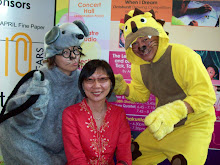What does research tell us about teacher learning?
Read moreat
http://singteach.nie.edu.sg/teacher-ed.htmlArticle highlights:What research shows about teacher learning?
When the workshop ends - and real learning begins!
Getting the most out of your professional development
Find out more from:
SingTeach: new issue
at
http://singteach.nie.edu.sg/language-ed.htmlSingTeach is an e-magazine produced for teachers and teacher educators by the National Institute of Education, Nanyang Technological University, Singapore.
It keeps you informed about the latest events in NIE.If you would like to subscribe to the SingTeach mailing list, just send an email to
sgteach@nie.edu.sg with the subject title "subscribe”
What does research tell us about teacher learning?full text of the article is available at
http://singteach.nie.edu.sg/teacher-ed.htmlThe following is what I extracted from the article:
Lessons learned outside the classroomHave you ever wondered if the 100 hours you clock in for professional development is really helping to make you a better teacher? Read on to find out what the research shows.
"Professional development is a continuous process of individual and collective examination and improvement of practice.” (American Federation of Teachers)
As teachers, we attend countless workshops and in-service courses. Added to these, there are many other avenues for teacher learning to take place, such as action research, reflective journals and online communities.
They are part and parcel of a teacher's life.
But how many of those workshops actually improve our pedagogy?
How much of the new knowledge we gained is translated into better teaching practice?
Maximizing your learning
In their project, “Teacher Learning and the Acquisition of Professional Knowledge”, American researchers Suzanne Wilson and Jennifer Berne surveyed a number of research projects and found three themes that make for effective teacher learning.
1. Learning must be activatedTeacher learning needs to be “activated”, ...“see” learning in action – when they learned to learn as their students would. By being able to identify with their students, they were able to understand the curriculum more thoroughly and thus became better teachers.
2. Learning must be sharedInteraction is integral to teacher learning. When teachers are able to come together and talk about what they do, to share teaching beliefs and practices, and to critique each other as professionals – that is where learning truly begins...
3. Learning must continueFor real learning to take place, it must continue long after the seminars and workshops are over. The researchers noticed that many of the teachers involved in the projects stayed in touch long after the projects were over. This enabled them to continually meet and share their experiences in and out of classrooms.
...
So we know what makes for effective teacher learning. What we often forget is that real learning is hard work!
...
What does research tell us about teacher learning?For more details, read the full text of the article at
http://singteach.nie.edu.sg/teacher-ed.html

